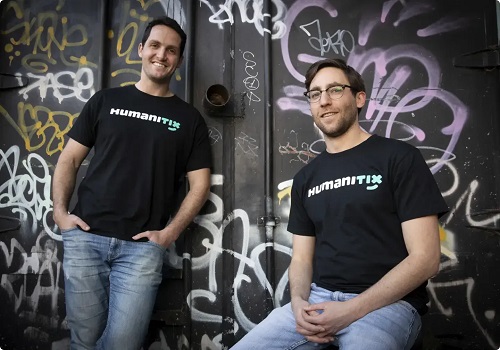Imagine if Amazon’s mission was to restore the Amazon rainforest… that project would have been completed a decade ago…
Seven years ago, I was on a hiking trip with my high school mate, Adam McCurdie, in Sri Lanka, just months after Sri Lanka’s civil war. We came across an abandoned house that had been completely blown out, yet the cups and saucers inside remained neatly stacked on the kitchen shelves, an image that engraved itself into our minds. The beautifully ordinary cups surrounded by unthinkable destruction struck us as a representation of life’s volatility and fragility, and it made us appreciate our privilege of being born into the safety and comfort of Australia. It was that night, camping under the stars, that we pledged to one another that we’d create a career of purpose, but most importantly that we’d ‘act as one’ and support the other when one of us came up with a game-changing idea for the world.
Fast forward a few years, Adam and I were both professionals in Sydney; he was in management consulting, and I was a hedge fund analyst. A few years had passed since our pledge and to be honest both of us were feeling somewhat anxious that we were ‘drifting along’ no closer to doing good in this world. In our roles we’d witnessed the impact that enterprise and technology can have on the world, and wanted to harness that power for good, whereas it is so often used carelessly.
Inspired by brilliant social entrepreneurs like Muhammad Yunus, we began searching for industries with inefficiencies that could be ripe for reinvention. Then we found it: tickets. Everyone hates booking fees, and excessive booking fees are neither good for the fans or the performers. So, in 2016, we formed Humanitix and ambitiously set out to disrupt ticketing for good, by removing shareholders, improving accessibility at events for people with disabilities, and using 100% of fee profits to support children’s charities.
As we were a nonprofit, we couldn’t access traditional startup revenue streams such as venture capital to launch the business. As a result, I stayed in my job and split my salary with Adam so that he could focus full-time on developing our minimum viable product. It was clear from the start that our crazy idea wasn’t so crazy. We stayed laser-focused on developing a great product with amazing customer support, and event organizers rapidly began switching to Humanitix for the superior customer experience and “no-brainer” social benefits of our 100% for-purpose model.
Soon, we secured financial backing from the Atlassian Foundation and the New South Wales Government, and landed our first celebrity ambassador with legendary Australian rugby captain, John Eales. In 2018, Humanitix won the Google Impact Challenge and became the fastest-growing ticketing platform in Australia and New Zealand. We recently expanded into North America by opening an office in Denver, Colorado.
Our rapid growth, even through COVID’s devastation of the live-event marketplace, is proof that our model works. A crucial decision we made at the outset was our commitment not to rely on our social impact as our exclusive competitive differentiator. It was crucial that our platform was as good as, if not better than, those of our competitors, and that our price was competitive. Once we achieved that standard, our for-purpose model was a real advantage. People want to do good, and the less you ask them to sacrifice to do so, the more impact your organization can ultimately have.
But the for-purpose model isn’t solely advantageous in securing users. It’s been inspiring to observe that it’s also had wonderous impact within the organization itself. Our employees are driven by more than a paycheck and benefits; they work here because their work has very real impact. The success and growth of the company means more money toward children’s education, which has proven to be an exceptionally strong and inexhaustible motivator for our team. Our account executives genuinely want our clients to sell as many tickets as possible not because it contributes to some quota or bottom line, but because a meaningful percentage of every ticket sold goes to charity. This next level of purpose makes a real difference that clients can feel and also allows us to maintain an incredible rate of employee retention.
The social enterprise model doesn’t just retain employees effectively, it also attracts them. Often, there is a cruel tradeoff in professional work. Typically, charity work is not well-paid and may not provide opportunities for bright and highly-skilled people to utilize their abilities in challenging and satisfying ways. At Humanitix, we’ve created a space where engineers, account managers, product developers, salespeople, and more can really flex their muscles and tackle problems as complex as those they’d find at any for-profit company, while simultaneously making a positive impact on the world.
To date, we have transformed over $1M of annoying booking fees into helping disadvantaged children around the world. That figure doesn’t include the huge amount of money we’ve saved nonprofit organizations by allowing them to use our platform at cost price. We have surpassed corporate giants like Eventbrite in Australia and New Zealand, and we continue to expand rapidly in the US, with Boston Consulting Group estimating that we are on track to becoming the world’s first social unicorn.
It is this idea of growing a sustainable, self-funding charity through technology that we’ve always found so exciting. Our ultimate goal is to create an entire suite of self-funding social enterprises that delivers best-in-class products and services, all while doing our part to tackle a wide variety of the world’s problems. We have learned a lot and still have a very long road ahead of us. But hopefully our modest success can inspire other entrepreneurs to build businesses around cause areas that are meaningful to them and to use their innovative ideas for the greater good.
Joshua Ross is the co-founder & director of Humanitix

